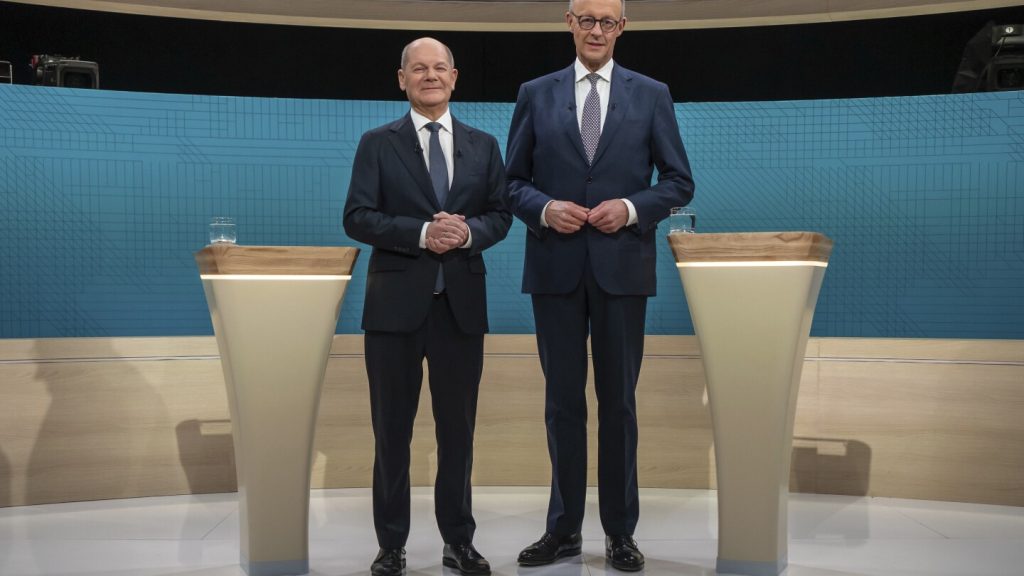A Clash of Perspectives in the German Election Debate
In a heated pre-election debate held on Sunday, German Chancellor Olaf Scholz and his main challenger, Friedrich Merz, addressed a range of pressing issues, both domestic and international, as Germany gears up for its federal election on February 23. The debate, broadcast on ARD and ZDF public television, highlighted the stark differences in their approaches to governance, foreign policy, and social issues. One of the most contentious topics was U.S. President Donald Trump’s recent suggestions about the Gaza Strip, which sparked strong reactions from both candidates. While Scholz condemned the proposal as a “scandal” and “terrible,” Merz struck a more cautious tone, acknowledging the unpredictability of Trump’s administration but urging patience to discern the seriousness of such proposals.
Scholz and Merz on Trump’s Gaza Proposal
Chancellor Scholz was unequivocal in his criticism of Trump’s suggestion to redevelop the Gaza Strip into “the Riviera of the Middle East,” calling it “a scandal” and emphasizing the unacceptability of relocating populations under international law. He also highlighted the devastation already present in Gaza, making such a proposal not only legally problematic but also morally insensitive. Scholz further drew attention to the positions of Egypt and Jordan, signaling the importance of regional perspectives in addressing the Israeli-Palestinian conflict.
Merz, on the other hand, adopted a more measured approach. While he agreed with Scholz’s assessment, he cautioned against overreacting to what he described as a series of disconcerting but potentially rhetorical proposals from the Trump administration. Merz suggested that the true intent and feasibility of such ideas would only become clear over time, urging a wait-and-see approach. This contrast in responses underscored the differing styles of the two candidates: Scholz’s direct and principled opposition versus Merz’s pragmatic cautiousness.
Domestic Challenges Take Center Stage
Beyond foreign policy, the debate delved into pressing domestic issues, including Germany’s struggling economy and migration. Scholz and Merz presented competing visions for addressing these challenges, reflecting their ideological differences. Scholz emphasized the need for structural reforms to revive the economy, while Merz advocated for stricter migration controls to ease the burden on public resources. Both candidates acknowledged the gravity of these issues, which are likely to dominate the election campaign in the coming weeks.
Foreign Policy and Transatlantic Relations
The debate also highlighted the significance of transatlantic relations under the new Trump administration. Merz described Trump as “predictably unpredictable,” a characterization that underscores the challenges of navigating ties with a U.S. president known for his unconventional approach to diplomacy. Scholz, meanwhile, reiterated his commitment to clear communication with Trump, emphasizing the importance of “clear words and friendly conversations” in addressing disagreements. He cited his recent public statements on Trump’s remarks about the Panama Canal and Greenland, where he underscored the need for all countries to respect existing borders.
Both candidates agreed on the importance of European unity in the face of an unpredictable U.S. administration. Scholz pointed to ongoing efforts to strengthen NATO’s presence in Greenland, while Merz pledged to prioritize European solidarity if elected. The debate made it clear that, regardless of who wins, Germany’s relationship with the U.S. and its role in European unity will remain critical in the coming years.
A Divide on Social Issues
One of the most striking moments of the debate came when the candidates were asked about Trump’s decision to recognize only two sexes—male and female. Scholz firmly criticized the move as “inappropriate,” arguing that every individual should be free to live as they choose. Merz, however, expressed understanding for the decision, aligning himself with a more conservative stance on gender issues. This exchange revealed significant differences in their social policies, with Scholz embracing a progressive stance and Merz appealing to traditional values.
The Path Forward: Unity and Preparedness
As the debate concluded, both candidates emphasized the need for unity and preparedness in addressing the challenges ahead. Scholz highlighted Germany’s readiness to respond to potential U.S. tariffs against the EU, stating that the bloc could act “in an hour” if necessary. Merz, for his part, stressed the importance of European cohesion, pledging to work tirelessly to strengthen unity across the continent.
In sum, the debate showcased the contrasting approaches of Scholz and Merz, highlighting their differences on domestic policy, foreign relations, and social issues. As Germany approaches the election, voters will have to decide which vision aligns most closely with their aspirations for the country’s future.












